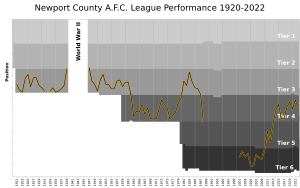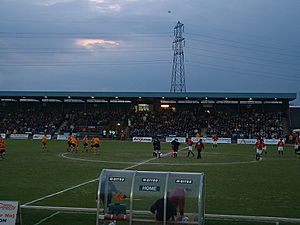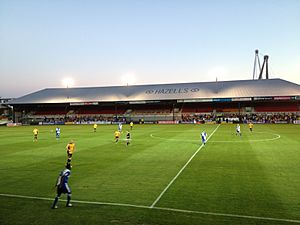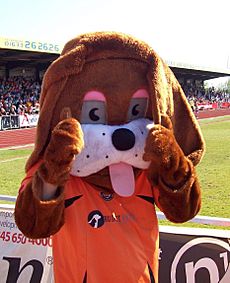Newport County A.F.C. facts for kids
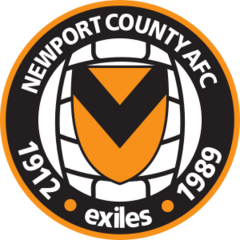 |
||
| Full name | Newport County Association Football Club | |
|---|---|---|
| Nickname(s) |
|
|
| Short name | Newport County | |
| Founded | 1912 (founded) June 1989 (reformed) |
|
| Ground | Rodney Parade | |
| Capacity | 7,850 | |
| Coordinates | 51°35′18″N 2°59′18″W / 51.588332°N 2.988207°W | |
| Owner | Huw Jenkins 52%, Newport County AFC Supporters Trust 27%, Other investors 21% |
|
| Chairman | Huw Jenkins | |
| Manager | David Hughes | |
| League | League Two | |
| 2018–19 | League Two, 7th of 24 | |
|
|
||
Newport County AFC (also known as Clwb Pêl-droed Casnewydd in Welsh) is a professional football club. They are based in the city of Newport, South Wales. The team plays in League Two, which is the fourth level of the English football league system. Their home kit usually features amber shirts and black shorts.
The club started in 1912. They joined the Football League Third Division in 1920. After leaving the Football League in 1931, they returned in 1932. They became champions of the Football League Third Division South in 1938–39. After World War II, they played in the Football League Second Division for one season.
In the 1979–80 season, under manager Len Ashurst, they won promotion from the Football League Fourth Division. They also won the Welsh Cup for the first time. The next year, they reached the quarter-finals of the UEFA Cup Winners' Cup. In the 1980s, the club faced money problems. They lost their Football League spot in 1988 and closed down in February 1989.
The club reformed but could not play at their old home, Somerton Park. This led to their nickname, "The Exiles." They quickly won the Hellenic Football League in 1989–90. They also earned promotion from the Southern Football League Midland Division in 1994–95. After moving to Rodney Parade in 2012, they returned to the Football League. This happened after winning the Conference National play-off final in 2013.
Contents
- Club History
- Playing in the Second Division
- Life in the Third Division
- Years in the Fourth Division
- Promotion and European Adventures
- Financial Troubles and Club Closure
- Reformation and Return Home
- Moving Up the Leagues
- Back in the Conference Premier
- Return to League Two
- Supporters Trust Takes Over
- Success Under Michael Flynn
- Recent Seasons
- Kit and Sponsors
- Club Ownership
- Supporters
- Players
- Coaching Staff
- Club Honours
- Images for kids
- See also
Club History
Newport County, first called The Ironsides, began playing in the Southern Football League in 1912. Their first home ground was Somerton Park. The club's full name was The Newport & Monmouthshire County Association Football Club. However, everyone soon called them Newport County. The club reformed in 1919 and joined the Football League in 1920. They left the league in 1931 but rejoined for the 1932–33 season. After almost 20 years in the Football League Third Division South, they won promotion. They became champions in 1939 under manager Billy McCandless.
Playing in the Second Division
Everyone hoped the team would do well in the Second Division. But only three games were played in the 1939–40 season. This was because World War II started. Newport County drew 1–1 with Tottenham Hotspur and won 3–1 against Southampton. The season was then stopped.
After the war, the club reformed. They played in the temporary Football League South for the 1945–46 season. When national league football restarted in 1946–47, Newport returned to the Second Division. However, the team lost many games. This included a record 13–0 defeat at Newcastle United. Despite some wins, they finished last and were relegated.
Life in the Third Division
Newport reached the fifth round of the 1948–49 FA Cup under manager Tom Bromilow. This was their best FA Cup run at the time, later matched in 2019. They lost a close game 3–2 to Portsmouth. Portsmouth went on to reach the FA Cup semi-finals and win the First Division that season.
After 11 more seasons in the Third Division South, the club almost faced another relegation. This was when the Football League Fourth Division was created for the 1958–59 season. Newport avoided this by just four points. However, in 1962, with only seven wins all season, the club was relegated to the Fourth Division. They stayed there for the next 18 years.
Years in the Fourth Division
Billy Lucas managed Newport County three times between 1953 and 1961. County reached the fourth round of the 1956–57 FA Cup. They lost 2–0 to Arsenal in front of 20,000 fans at Somerton Park. In the 1958–59 FA Cup, County played Tottenham Hotspur in the fourth round. The game was played in heavy snow at White Hart Lane. County lost 4–1, but their goal was a great 35-yard shot by Ken Hollyman.
In January 1964, under Billy Lucas again, County played Burnley in the FA Cup fourth round. Burnley were Division One champions in 1960. Newport lost 2–1.
In the 1970–71 season, the team, managed by Bobby Ferguson, set an unwanted Football League record. They did not win any of their first 25 matches. Results improved the next season under Billy Lucas. In 1972–73, Newport almost won promotion, missing out only on goal average.
For the 1976–77 season, the team changed their kit to light blue and white stripes. This was like the Argentina national team's kit. However, the team still struggled until Colin Addison took over in January 1977. This season became known as "the great escape." County avoided relegation with a 1–0 win at home against Workington in the last game.
Promotion and European Adventures
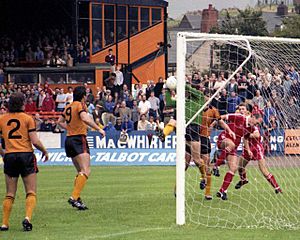
The 1980s brought both the best and worst times for Newport County. Len Ashurst was manager from 1978 to 1982. This was the club's most successful period. In the 1978–79 FA Cup, County beat West Ham United 2–1. In 1980, they finally won promotion from the Football League Fourth Division. County secured promotion in the last match of the season with a 4–2 win at Walsall.
The team included a young John Aldridge, who later became a famous goal-scorer for Liverpool. Tommy Tynan scored the important goal that sealed County's promotion. Dave Gwyther was another key goal-scorer. Captain Keith Oakes led the defence. Young players Steve Lowndes and Nigel Vaughan went on to play for the Wales national team. This was also the year County won the Welsh Cup. This allowed them to play in the European Cup Winners' Cup in the 1980–81 season.
The 1980–81 European Cup Winners' Cup was exciting. They beat Crusaders of Northern Ireland 4–0 on total score. In the second round, they beat SK Haugar of Norway 6–0 at home after a 0–0 draw away. This took them to the quarter-finals against Carl Zeiss Jena F.C. of East Germany. The away leg was a 2–2 draw, with Tommy Tynan scoring both goals. However, Newport lost the home leg 1–0 in front of 18,000 fans. Carl Zeiss Jena went on to be the cup runners-up.
In the 1982–83 season, Colin Addison, in his second time as manager, led Newport County to their highest league finish after the war. They finished 4th in the Third Division. County had even been top of the table in early April. But they missed out on promotion after a poor run of results. County also played First-Division team Everton in the third round of the 1982–83 FA Cup.
In 1986, County reached the FA Cup third round, losing to Sunderland. Newport played in the Welsh Cup final again in 1987, losing to Merthyr Tydfil.
Financial Troubles and Club Closure
Despite reaching the Welsh Cup final, County was relegated from the Third Division in 1987. In 1988, they finished last in the Fourth Division. This meant their 60-season stay in the Football League was over. They could not finish their first season in the Conference and closed down on 27 February 1989. They had debts of £330,000. Their results for that season were removed.
Reformation and Return Home
In June 1989, 400 supporters reformed the club. John Relish was re-appointed manager. They joined the Hellenic Football League, which was four divisions below the Football League. The club's main goal was to get back into the Football League. The club was called "Newport A.F.C." and got the nickname "The Exiles." This was because they had to play home matches in Moreton-in-Marsh, about 80 miles from Newport. Newport Council would not let them use Somerton Park because of unpaid rent.
Newport won the Hellenic League and were promoted to the Southern Football League. After playing at Somerton Park for two seasons, the Football Association of Wales (FAW) made them play in England again. They shared Gloucester City's stadium for two seasons. The club had to take legal action to stay in the English football league system. This legal fight was successful. It allowed them to have a permanent home in Newport at the new Newport Stadium.
In their first season back in Newport, 1994–95, they were promoted to the Southern League Premier Division. They won the Midland Division Championship by 14 points. They also set a Southern League record by winning 14 league matches in a row.
Moving Up the Leagues
In 1999, the club changed its name back to Newport County A.F.C.
In the 2001–02 season, the team reached the first round of the FA Cup for the first time since reforming. They drew with Second Division side Blackpool. After a 2–2 draw away, County lost the home replay. The next season, Newport reached the final of the FAW Premier Cup. They beat Swansea City and Cardiff City before losing to Wrexham.
When non-league football was reorganised, County joined the Conference South in 2004–05. Peter Beadle became manager in October 2005. In the 2006–07 season, Newport reached the FA Cup first round again but lost to Swansea City. They also reached the FAW Premier Cup final for the second time, losing to TNS. Newport finished just below the play-off spots that season.
In the 2007–08 season, Newport won the last-ever FAW Premier Cup, beating Llanelli 1–0. For the second year in a row, a last-day defeat stopped County from reaching the Conference South play-offs. In April 2008, Peter Beadle was replaced by Dean Holdsworth.
In his first full season, Holdsworth led Newport to a 10th-place finish. Newport went top of the league in September 2009–10 and stayed there. They won the league title in March 2010. This made them the first team in the English football leagues to win promotion that season. County finished with a Conference South record of 103 points. Craig Reid was the league's top scorer with 24 goals.
Back in the Conference Premier
Newport County was promoted to the Conference Premier for the 2010–11 season. This was the same level they played at before their financial problems in 1989. Dean Holdsworth left Newport County in January 2011 to manage Aldershot Town. Anthony Hudson became the new manager in April 2011. The team finished their first season back in ninth place.
After a bad start to the 2011–12 season, Hudson was sacked in September 2011. Justin Edinburgh took over in October 2011. Under Edinburgh, County finished 19th and stayed in the Conference Premier. They also reached the 2012 FA Trophy Final and played at Wembley Stadium for the first time. This was also the club's 100th anniversary. County lost the final 2–0 to York City.
In May 2012, Newport County announced they would move to Rodney Parade, the city's rugby stadium. In August 2012, lottery winner Les Scadding became the club chairman. In February 2013, they signed a 10-year lease to play at Rodney Parade.
The 2012–13 season was the club's centenary year. Newport County finished third in the Conference Premier. They reached the play-offs for the first time. They beat Grimsby Town 2–0 over two games in the semi-final. This sent them to the 2013 Conference Premier play-off final at Wembley Stadium. The final against Wrexham was the first Wembley final with two Welsh teams. Newport County won 2–0. This meant they returned to the Football League after 25 years, gaining promotion to League Two. Newport was given the Freedom of the City of Newport in August 2013 for this achievement.
Return to League Two
In their first season back in the Football League, 2013–14, Newport County finished 14th in League Two. On 7 February 2015, with Newport County in sixth place, Justin Edinburgh became manager at Gillingham. Jimmy Dack took over as caretaker manager and then manager until the end of the 2014–15 season. Newport finished ninth in League Two. Terry Butcher was appointed manager in April 2015. In June 2015, Les Scadding resigned as chairman.
Supporters Trust Takes Over
In October 2015, the Newport County Supporters' Trust took over ownership of the club. Tony Pring became interim chairman. Butcher was sacked on the same day, as Newport was at the bottom of League Two. John Sheridan was appointed manager until the end of the 2015–16 season. Results improved. Sheridan resigned in January 2016 to manage Oldham Athletic. Assistant manager Warren Feeney became manager. Newport finished 22nd in League Two, avoiding relegation.
Feeney was sacked in September 2016. First team coach Michael Flynn became caretaker manager for the remaining 12 league matches of the 2016–17 season. A great recovery saw Newport avoid relegation. This was sealed by a 2–1 victory at home against Notts County on the final day. Mark O'Brien scored the winning goal in the 89th minute. This season became known as the second "great escape."
Success Under Michael Flynn
On 9 May 2017, Flynn was made permanent manager. On 7 January 2018, Newport won 2–1 at home against Championship club Leeds United in the FA Cup third round. This meant Newport reached the FA Cup fourth round for the first time since 1979. In the next round, they drew Premier League club Tottenham Hotspur at home. On 27 January 2018, Newport drew 1–1, forcing a replay at Wembley Stadium. Tottenham won the replay 2–0. County finished the 2017–18 season in 11th place in League Two.
Newport started the 2018–19 season well, getting 23 points from their first 10 games. On 6 January 2019, County won their FA Cup third round match against Premier League club Leicester City 2–1. The next round drew Newport away against Championship club Middlesbrough. They drew 1–1 and won the home replay 2–0. County reached the FA Cup fifth round, which they had not done since 1949. They played against Premier League champions Manchester City at home on 16 February 2019. County lost 4–1, with striker Pádraig Amond scoring a late goal. Amond was a joint-top scorer in the competition. Newport finished the 2018–19 season in 7th place in League Two. This meant they qualified for the play-offs. In the semi-final against Mansfield Town, Newport won a penalty shoot-out. In the League Two play-off final at Wembley Stadium, Newport lost 1–0 to Tranmere Rovers in the 119th minute.
On 27 August 2019, Newport County played West Ham United in the EFL Cup, losing 2–0. Newport also reached the semi-final of the EFL Trophy for the first time in February 2020, losing on penalties. The 2019–20 season was stopped in March 2020 due to the COVID-19 pandemic. Newport was in 15th place. The League Two season officially ended in June 2020. Newport County finished 14th based on points per game.
On 22 September 2020, Newport County beat Championship club Watford 3–1 at home in the EFL Cup third round. This was their first time reaching the fourth round. Newport then played Premier League club Newcastle United at home. After a 1–1 draw, Newcastle won the penalty shoot-out. Newport reached the third round of the 2020–21 FA Cup. They played Premier League club Brighton & Hove Albion at home and lost on penalties after a 1–1 draw. On 19 January 2021, goalkeeper Tom King scored his first career goal. It was a wind-assisted goal kick from 96.01 metres (105 yards). This broke the Guinness World Record for the longest football goal. Newport finished the 2020–21 season in 5th place in League Two and qualified for the play-offs. Newport beat Forest Green Rovers 5–4 to reach the play-off final for the second time in three seasons. On 31 May 2021, Newport lost 1–0 to Morecambe in the League Two play-off final at Wembley Stadium.
On 25 August 2021, Newport County played Southampton in the EFL Cup second round, losing 8–0. Michael Flynn resigned as Newport County manager on 1 October 2021.
Recent Seasons
On 19 October 2021, James Rowberry was appointed manager. Newport finished the 2021–22 League Two season in 11th place. On 10 October 2022, Rowberry was sacked.
On 20 October 2022, Graham Coughlan became manager. Newport reached the third round of the 2022–23 EFL Cup, losing to Leicester City. Newport finished the 2022–23 season in 15th position in League Two. In August 2023, Newport County reached the second round of the 2023–24 EFL Cup. They lost on penalties to Brentford after a 1–1 draw.
On 24 January 2024, Huw Jenkins bought a controlling share (52%) in Newport County from the Supporters Trust. In February 2024, Newport reached the fourth round of the 2023–24 FA Cup. They lost 4–2 to Manchester United. Newport finished the 2023–24 season in 18th place in League Two. On 20 June 2024, Graham Coughlan left the club.
On 16 July 2024, Nelson Jardim was appointed Head Coach. Jardim left Newport County on 24 April 2025. The club was in 20th position in League Two and safe from relegation. Assistant head coach Dafydd Williams took over for the last two matches. Newport finished the 2024–25 season in 22nd place in League Two. On 23 May 2025, David Hughes was appointed as team Manager.
Kit and Sponsors
| Period | Kit Manufacturer | Shirt Sponsor |
|---|---|---|
| 1974–1975 | Adidas | None |
| 1975–1976 | None | |
| 1976–1977 | Bukta | |
| 1977–1979 | Adidas | |
| 1982–1983 | Patrick | |
| 1983–1985 | South Wales Argus | |
| 1985–1989 | Spall | |
| 1989 | Scoreline | JLA |
| 1989–1990 | Umbro | AFG Newport, Newport Ford |
| 1990–1991 | None | None |
| 1991–1992 | Balan Sports International | Pirelli Cables |
| 1992–1993 | George Ford Motor Spares | |
| 1993–1994 | None | Tom Witton Carpets |
| 1994–1995 | ProStar | Courage Best Bitter |
| 1995–1996 | Edwards Sports | Empress Car Sales |
| 1996–1997 | CableTel | |
| 1997–1998 | ICIS | none/David McLean Homes (2nd half of season) |
| 1998–1999 | Acorn Recruitment | |
| 1999–2007 | Errea | Acorn Recruitment |
| 2007–2009 | Joma | |
| 2009–2011 | Lotto | |
| 2011–2013 | Macron | |
| 2013–2014 | 32Red | |
| 2014–2017 | Mr. Tom | |
| 2017–2018 | FBT | |
| 2018–2019 | Interbet | |
| 2019–2020 | Paddy Power | |
| 2020–2023 | Hummel | Alzheimer's Society, Pure Vans |
| 2023– | VX3 Sportswear | Pure Vans |
Club Ownership
In 2015, after the club was sold by its main owner Les Scadding, the Newport County AFC Supporters Society Limited was created. This group is a trust run by an elected board. Members of the Supporters Trust own shares in the club.
In October 2023, members of the Newport County Supporters Trust voted to sell a controlling share (52%) of the club to Huw Jenkins. He was a former chairman of Swansea City. The Supporters Trust kept 27% of the shares. Other investors kept 21%. The sale was completed on 24 January 2024.
Supporters
Newport County gets most of its support from the city of Newport. They also have fans from the wider Monmouthshire area. This is why the club's original name included "Monmouth County." The club's supporters call themselves the "Amber Army." This refers to the club's traditional amber colour.
The supporters' unofficial song is Come on the County. It was first released in 1973 and re-recorded in 1999 and 2010. For the 2012 FA Trophy final, singer-songwriter Tracey Curtis wrote A Hundred Years of Football (And We're Off To Wembley).
In the 1970s and 1980s, comedian Frank Carson was a director and vice president. This helped raise the club's profile. Newport-based rappers Goldie Lookin' Chain are also supporters of the club. They were the team's shirt sponsors for some matches in the 2004–05 season.
Rivalries
County fans see their main rival as South Wales club Cardiff City. However, these two teams have not played each other often since the 1980s. This is because they have been in different leagues. Other rivals include Welsh clubs Swansea City and Wrexham. They also have rivalries with nearby clubs like Bristol Rovers, Cheltenham Town, and Forest Green Rovers.
When County played in non-league football, Merthyr Tydfil and Bath City were considered rivals. County also used to have a rivalry with Hereford United. However, that club closed down in 2014, and a new club, Hereford FC, was formed.
Players
Current Squad
|
|
Development Squad Players
|
|
Youth Academy
Glyn Jones became director of the Newport County Youth Academy in 1997. In 1998, Newport County started a partnership with Newport City Council. The club has a youth development program with about 50 students. They are based at Llanwern High School.
The youth team plays in the Under-18 EFL Youth Alliance. Many academy players have gone on to play for the senior team. These include Andrew Hughes, Lee Evans, Regan Poole, and Aaron Collins.
In the 2001–02 season, County's youth team won the English Schools' Football Association under-19 trophy. In the 2004–05 season, they won the FAW Youth Cup.
In May 2014, Michael Flynn took over as academy director. In 2015, the academy was changed to meet FA rules. Grant Kalahar was appointed academy manager in June 2015. He left at the end of the 2015–16 season. Byron Anthony then became academy manager.
Newport County were champions of the EFL Youth Alliance in the 2016–17 season.
Coaching Staff
| Position | Staff |
|---|---|
| Manager | |
| Assistant Manager | |
| Goalkeeping coach | |
| Chief Footballing Officer | Lucy Kelly |
| Head of performance | Scott Wickens |
| First-team lead performance analyst | Conor McGaharan |
| First-team physio | Tom Gittoes |
| Fitness coach | Connor Neeson |
| Kitman | |
| Head of Academy Recruitment | Sam Bladen |
| Academy Manager | Luke Hussey |
| Academy Head of Coaching | Ben Gast |
| Under 18's Coach |
Club Honours
Here are some of the titles Newport County has won:
League Titles
- Third Division South (level 3)
- Champions: 1938–39
- Fourth Division (level 4)
- Promoted: 1979–80
- Conference Premier (level 5)
- Play-off winners: 2013
- Conference South (level 6)
- Champions: 2009–10
- Southern League Midland Division
- Champions: 1994–95
- Hellenic League
- Champions: 1989–90
Cup Wins
- FA Trophy
- Runners-up: 2011–12
- Welsh Cup
- Winners: 1979–80
- FAW Premier Cup
- Winners: 2007–08
Images for kids
See also
 In Spanish: Newport County Association Football Club para niños
In Spanish: Newport County Association Football Club para niños


